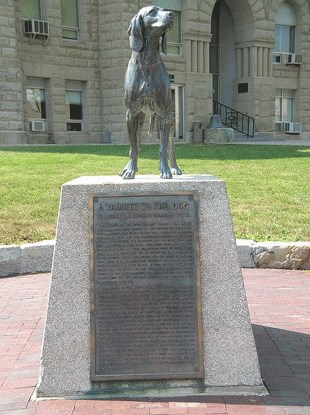
“Man’s best friend.” Do you know the genesis of this famous phrase?
“Old Drum” was a black and tan hound (probably a Black and Tan Coonhound) who was known in his neck of the woods for being an exceptional hound. One night in 1869, he wandered onto the property of a neighbor who fatally shot the dog. Old Drum’s owner sued the neighbor, and the case eventually found its way into the Supreme Court. It was an emotionally charged trial famous, and it became famous for what the lawyer representing Old Drum’s master said. It’s long, but it’s worth sharing:
“Gentlemen of the jury, the best friend a man has in this world may turn against him and become his enemy. His son or daughter whom he has reared with loving care may prove ungrateful. Those who are nearest and dearest to us—those whom we trust with our happiness and good name—may become traitors in their faith. The money that a man has he may lose. It flies away from him, perhaps when he needs it most. A man’s reputation may be sacrificed in a moment of ill-considered action. The people who are prone to fall on their knees to do us honor when success is with us may be the first to throw the stone of malice when failure settles its cloud upon our heads. The one absolute, unselfish friend that man can have in this selfish world—the one that never proves ungrateful or treacherous—is his dog.
“Gentlemen of the jury, a man’s dog stands by him in prosperity and poverty, in health and sickness. He will sleep on the cold ground, where the wintry winds blow, and the snow drives fiercely, if only he can be near his master’s side. He will kiss the hand that has no food to offer; he will lick the wounds and sores that come in encounter with the roughness of the world. He guards the sleep of his pauper master as if he were a prince. When all other friends desert, he remains. When riches take wings and reputation falls to pieces, he is as constant in his love as the sun in its journey through the heavens.
“If fortune drives the master forth an outcast in the world, friendless and homeless, the faithful dog asks no higher privilege than that of accompanying him to guard against danger, to fight against his enemies. And when the last scene of all comes, and death takes the master in its embrace, and his body is laid away in the cold ground, no matter if all other friends pursue their way, there by his graveside will the noble dog be found, his head between his paws, his eyes sad but open in alert watchfulness, faithful and true even to death.”
Image of a bronze statue of Old Drum on the Johnson County Courthouse lawn in Warrensburg, MO.
